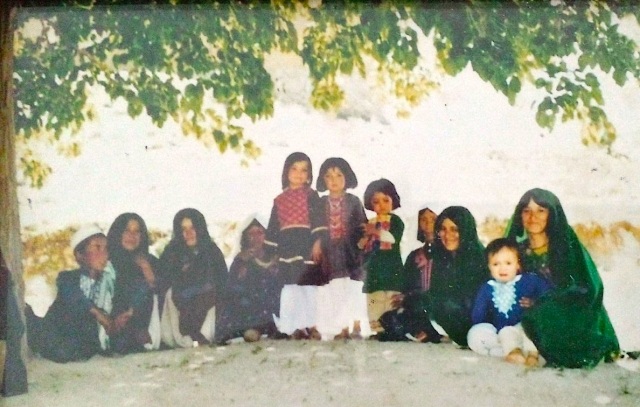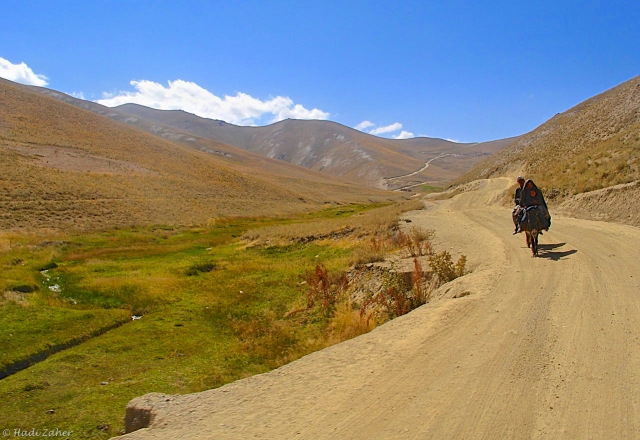There was once a degho named Kalbi Zawar in our village. He had big scratch marks on his forehead, and the hair and part of the ear on the right side of his head were missing. The children in the village were scared of him. It is said that in his younger days, he had slept near the barn one night to guard his cattle. A wolf had attacked him in his sleep, mauled him and disfigured his face forever. The villagers believed that a wolf will chase after any person it has bitten once; the scratch was the mark of the hunted. Zawar was afraid to go out alone at night for the rest of his life. He believed that the same wolf was out there looking for him.
 In the days of my father, people dwelled in the villages, and beyond them lived the predators. During the war, the people moved everywhere, some of the people became predators, and actual animals vanished. In those days, people always traveled in groups, and only the bravest and most clever men ventured into the high mountains to collect firewood and hunt. My father told me stories about people who had been attacked by bears and leopards around the Akhta valley, only a short distance away from the village.
In the days of my father, people dwelled in the villages, and beyond them lived the predators. During the war, the people moved everywhere, some of the people became predators, and actual animals vanished. In those days, people always traveled in groups, and only the bravest and most clever men ventured into the high mountains to collect firewood and hunt. My father told me stories about people who had been attacked by bears and leopards around the Akhta valley, only a short distance away from the village.
People were afraid of Bears. Bears built nests in and around their caves, and built little places to sleep, keep their cubs, jump around, and run up and down the slopes. Villagers rarely ventured past the foothills. A villager named Sayed Ismail once set out to walk to the Paato mountains. He ran into a pack of bears. The bears chased him, mauled him, and slapped him to near death. The nearby villagers heard his screams and came to his rescue. He had been beaten so bad, he was unrecognizable for weeks. The villagers wrapped him in sheepskin to save his life. He survived.
Wolves and hyenas were the most fearsome of all the animals in the mountains. The hunted in packs, attacked cattle, and when they could, killed and ate villagers. One afternoon, as I and my mother sat in the cattle barn, I sensed that there was something running round and around the barn. I alerted my mother, she looked out and said that it was a wolf. We reinforced the barn door and windows to keep the wolf out that night. But wolves are persistent, and that night, that wolf or that pack tried to dig under the barn wall to get inside and eat. We saw a dig area and scratch marks on the wall the next morning.
On another night, I almost lost my daughter Habiba to a hyena. She was probably 4 or 5 years old at the time. It was winter, the earth was covered in snow, and the men were busy sipping tea, smoking hookah, and reading the Shahnama. She had to go to the toilet, so I took her outside to the bushes behind the house. I was standing by and waiting for her to finish when I heard a growling sound. I looked up and saw this massive hyena running at us through the snow. It had its eyes locked upon us. I screamed as loud as I could. I grabbed Habiba and rushed for the house door. I had barely made five steps before the creature outmaneuvered me. It stood right at the door, staring at me, growling. I was paralyzed with fear, my arms became numb, I couldn’t scream, Habiba fell out of my arms, and I fell on my knees. Your grandfather and my brothers ran out of the house with shovels and sticks in their hands. The hyena ran away and disappeared into the darkness.
Many years later, one day as I sat home in the Sun and sipped tea, I heard Sakina scream. I ran towards the barn to see what was wrong.
Look Aabay, the chicken is eating a snake!
I went closer and saw that a large snake and the chicken were facing off. I gave Sakina a stick and told her to stand at the door. I picked a stick and attacked the snake. It slithered into a heap of alfalfa. I kept striking the heap with the stick, and hit anything that moved. I kept going. I killed that snake. I found it motionless. It was big. I could not even lift it with a shovel. I measured its length, and it was ten hand-span long. Snakes make home where they find food, and because of that, if you find a snake, you kill it.
Aabay Malik from the village did voodoo healing to treat people out of illnesses, bee stings and snake bites. She and her son could catch snakes. She treated and helped many to recovery, but she couldn’t save her own son. He had chased after a snake, and jumped into a pit full of snakes. The snakes bit him and wrapped around his legs. He had had to take off his Pyjamas to get the snake off. By the time he reached the village, his appearance had change. He had been bitten many times. His father and mother did these voodoo rituals and prayers for him for 4 days. But the venom had destroyed his organs. He kept spitting blood, and 4 days after the bites, he died.
I was twice stung by hornets. Both times I had to have injections to save me. The first time I got a sting, I was sleeping in front of the old house on a warm afternoon. I felt a sting on my left side. I quickly got up, took off my skirt, and threw it away. There was a yellow hornet there. I put some medicine on it, and thinking not much of it, tried to get back to sleep. In the space of an hour and perhaps less, I felt sick, I began stuttering, and then vomiting. I felt nauseous. Your grandfather gave me an injection, and only then I felt better. Another time, I was cutting up firewood when I was stung on my hand. The same thing happened again. I became drowsy, nauseous and very sick. Your late grandfather gave me the injection, and it made me better. To this day, I am scared of hornets buzzing around.
*Shahnama = The Shahnama is a long epic poem written by the Persian poet Ferdowsi between c. 977 and 1010 CE and is the national epic of Greater Iran
*degho = farmer
*watan = homeland
*Aabay = mother




